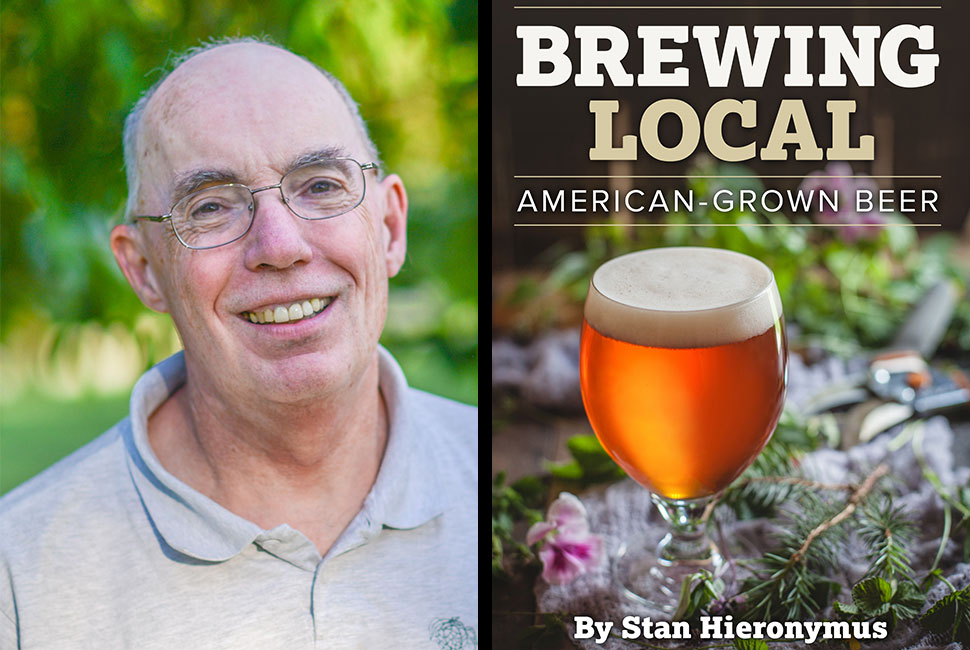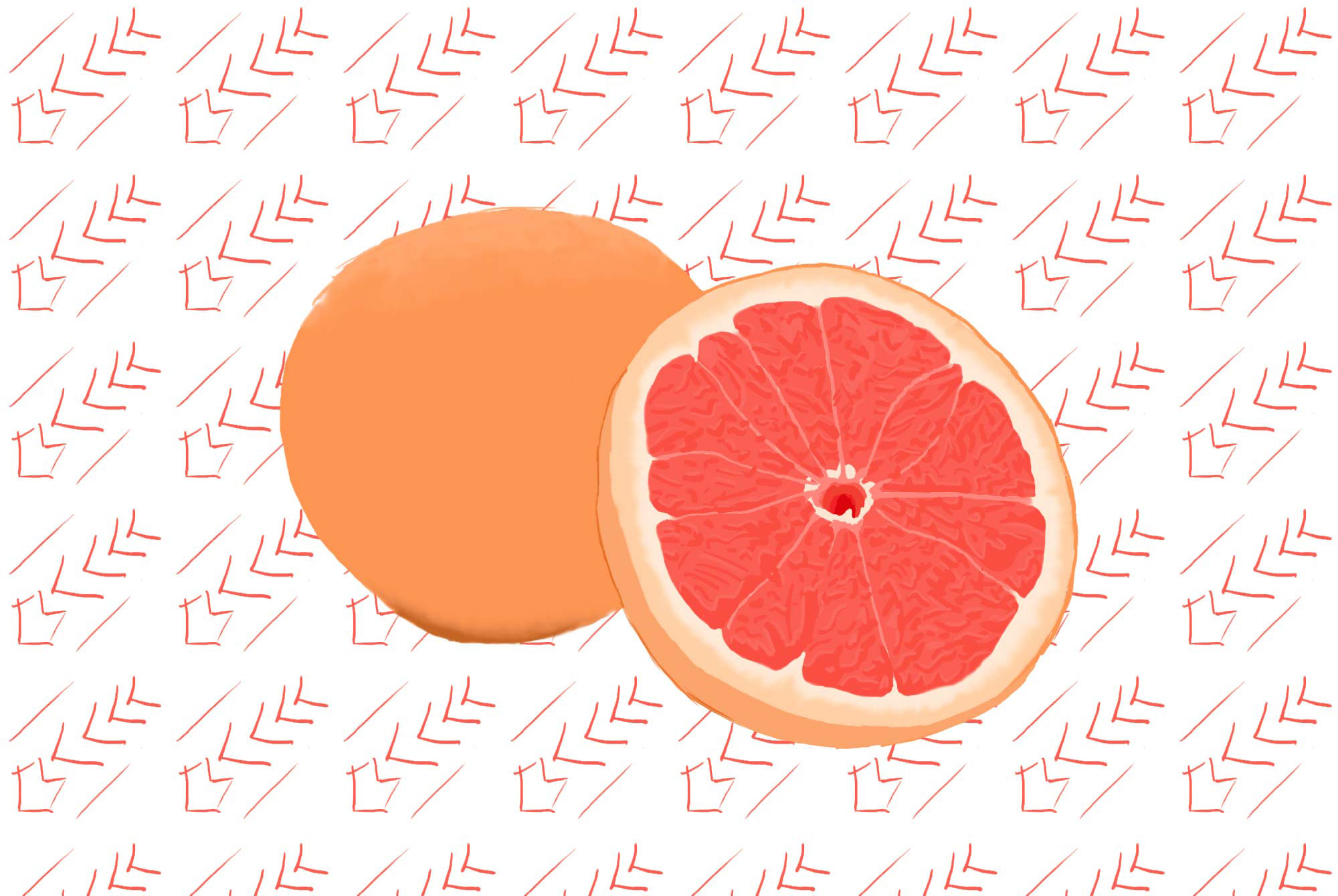Things we learned:
- Basil contains many of the same compounds as hops.
- Stan Hieronymus once published an annual music festival directory.
- An apricot pit can be poisonous when interacting with certain enzymes in the body.
- The first beer writer in the Hieronymus household was Stan’s wife, Daria.
- Beer writers should value independence and authenticity, and also secure a second job to pay their bills and enjoy the “potpourri of life.”
Stan Hieronymus is in demand. This past October, he was flown to Australia for a homebrew event, and later this year he’s off to South Africa. Hieronymus has published hundreds of articles, written for several online sources, and authored four books with Brewer’s Publications, including his newest release, Brewing Local. “Beer famous” is how Hieronymus refers to the success. He remains humbled by his coauthor and wife, Daria Labinsky, who has traveled with him to 49 states and throughout the world. One of craft beer’s best storytellers sat down with Hop Culture to talk plants, long drives, and authenticity.
Elisa Loeser: How do you balance being a beer writer and a technical expert?
Stan Hieronymus: That’s tricky. Somebody from The Boston Globe asked, “What’s the weirdest thing you’ve ever seen somebody brew with?” That’s basically a question that’ll be publicity for my book. But then somebody will ask me to do something like, technically edit their book for free and I’ll have to say, “I’m sorry, I don’t do that.” It’s a matter of choice. I try and keep it so that I’m the person who does the reporting [– not answering the questions –] and that’s about it.
EL: What’s the timeline typically like for writing a book, from when an idea begins to when it hits publication?
SH: In the case of the hops book, I knew that it would be longer because there were so many places to go. So we made sure that we had two harvest seasons.
EL: In Brewing Local, you highlight about 160 or so different beer ingredients from plants and fungi. What are some of the more interesting ones?
SH: The pit of the apricot. That’s something people generally aren’t going to eat when they eat the apricot, but if they’re throwing it in a beer, maybe they’ll just grind that pit up. However, there’s an enzyme in your stomach and when it interacts with a compound in the pit, it creates cyanide. You have to be careful about using those sorts of ingredients.
EL: What are some other things to look out for in Brewing Local?
SH: Thai basil’s really interesting. Basil contains many of the same compounds that hops do. The compounds interact with the hops and you get the same bio-transformations that you get with hops. You’ll create a little fruitier flavor and a little bit tropical. Also, we have three beet beers in the book, which would probably surprise people.
EL: How did you first get into beer writing?
SH: In the summer of 1991, [my wife] Daria and I had gone to the Badlands and Black Hills, and we started talking about quitting our jobs. I’d gone to work for the Peoria Journal Star in 1973 so by the time we got married I’d been there for 15 years. Working for newspapers in the 1980s was a lot better deal than it is now. Before we quit our jobs, I changed from working nights to working days. I was the number two position in the newsroom. I had a very nice office with a glass view of the newsroom. Stuff like that. I reached that cushy point. When we got married, Daria said, “I don’t want to live in Peoria forever.” I said, “That’s fine.” So we started talking about doing something different.
We went on the road down to Florida and pitched stories. One of the stories Daria pitched was for American Brewer Magazine. It was called “The Brewpubs of Florida.” She did that story and then she got several other assignments from the magazine. We also started a monthly newsletter, then we did a yearly directory to music festivals around the country… and set up in flea markets selling goods.
It was a potpourri of life in order to pay the bills and build up writing gigs. My first beer story was about Oldenberg Beer Camp and then that led to writing more beer stories. We went to England in 1994, and they had guides to their pubs around the country. Nothing like that existed in the United States, and we said, “The United States needs one of these,” not really thinking how big the country is, but we did it.
It was possible to make a living writing about beer if you wrote about everything. We wrote about pubs and the culture; we wrote about history. We did the travel column for All About Beer together. If you spent your entire working life as a journalist, it was like having a beat. You know the same things about asking questions, taking notes, and making deadlines.
EL: The industry has changed since you started writing. What advice do you have for beer writers getting into the industry today?
SH: For somebody that wants to write about beer, it’s a rare situation where that’s your only job. The beer publications don’t bring in enough revenue to say, “Here’s a full-time job.” There are a few full-time jobs, but they’re pretty rare. Value independence and authenticity and don’t cut corners. Make sure that you’ve got all the facts right and all of those other things.
EL: What is your favorite beer style or recipe?
SH: Back in the ‘90s, I made IPAs because I couldn’t get an IPA that I liked. Today, the only time I’ll make a hoppy beer is if I mess around with some experimental hop variety to see what it’s like, because we can get IPAs all the time, and they’re really good. So what interests me more are low-alcohol beers. It’s hard to make a low-alcohol saison. When Nathan Zeender [head brewer at Right Proper Brewing] was out here in the beginning of August for the Belgian Festival in St. Louis, the other brewers loved his beer, Ornithology, because it’s less than four percent and it had all this flavor. So that’s something I like making now. In terms of what I like drinking, it’s pretty much the whole range of beers. They’re just really interesting.
EL: Could you tell us a little but about the beer you chose today – Sierra Nevada’s Oktoberfest?
SH: Last year, Sierra Nevada started doing this collaboration with German breweries. This year’s beer is with Mahrs Bräu. It’s a brewery in the Franconian section of Bavaria. The beer uses an American-bred hop called Record. It’s actually disappeared in the U.S., but there’s a farm in Germany growing it. Basically, they had to buy the whole world’s supply of Record in order to brew this beer. There’s not much of the hop out there, it’s like one hectare maybe. It’s a nice, easy, light drinker.
EL: If you could have a beer with anyone, alive or dead, who that would be and why?
SH: Alive would be my wife. Otherwise, I’m voting for Woody Guthrie. Somebody who is a great storyteller and has a world view that I can agree with.
EL: What has the experience been like working with your wife for much of your life?
SH: When you think about it, we quit our jobs to go travel around together and work — that does sound like a recipe for potential trouble, but we’ve always been comfortable about not talking. When you’re sitting in a car together or a 14-hour drive, Peoria to New Orleans, you talk some, but you can also ride along. Even when we’re intensely together, we’re okay about having our space. And importantly, she copy edited the four books I’ve done for Brewer’s Publication, which was important to me. If you want to be a writer, you need your integrity. She doesn’t let me slack off.
EL: Is there a piece of advice that she’s given you or that you’ve received from someone else that has stuck with you throughout your career?
SH: She’s good at reminding me it’s a small pond that we work in. Randy Mosher’s wife tells him that he’s “beer famous.” That’s different than being famous. So I think that it’s easy to stay humble. This actually goes back to 1995 in Portland, Oregon, when we were talking with a publican [a person who owns a pub], who said that craft beer has made things better in Portland and how Portland was better than anybody else. We’d been with him for hours and hours and hours, and finally he sits back in his chair, sort of leans back and he says, “But you have to remember – it’s only beer.” So that’s the biggest thing for me. It helps me keep my perspective.



